Feed
-
ArticleConnecting with Prof Ayiro and Daystar UniversityProfessor and Vice Chancellor Laban Ayiro from Daystar University, Provost Teresa Woodruff, ISP Dean Steve Hanson, AAP leadership, and faculty in the College of Communications Arts and Sciences had the opportunity to meet Aug 24. Prof Ayiro met with leadership from the College of Communications and the KEY Team to discuss potential collaborative relationships. AAP is grateful for connecting with Prof Ayiro and Daystar University. Attached are photos from the event and lunch with Prof. Ayiro capturing Provost Teresa Woodruff, Professor Laban Ayiro, ISP Dean Steve Hanson, AAP Director Jose Jackson-Malete, AAP Director, Amy Jamison, Prof. David Ewoldsen, and Prof. Nancy Rhodes.By: Raquel AcostaThursday, Sep 9, 2021EDUCATION
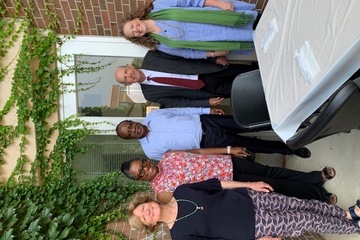
-
ArticleLECTURE: Coloniality of Higher Education in Africa, the Decolonisation Agenda, and Academic FreedomYou are cordially invited to the Annual NWU Lecture on Academic Freedomby Prof. Kwadwo Appiagyei-Atua, School of Law, University of Ghana,Legon, Accra.Topic: The Coloniality of Higher Education in Africa, theDecolonisation Agenda, and Academic FreedomDate and time: 15 September 2021, 14:00 to 15:30 SAST If you wish to attend by zoom, please RSVP here:https://urldefense.com/v3/__https://us02web.zoom.us/webinar/register/WN_45iNwZg9THawSADRufGyPA__;!!HXCxUKc!kPN0uvfLvGQ2OI8pyHfemNnhy1vtZVtyWJf3S_H1PlMaNUwFKaopZgNXOtevBAY$ (the event link will be provided to you)By: Annemi ConradieThursday, Sep 9, 2021EDUCATION
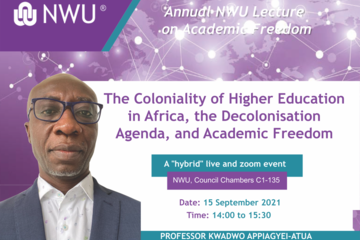
-
OpportunityAGRF 2021 Summit: Agricultural Transformation for Sustainable and Resilient Food SystemsAAP is excited to announce the “Agricultural Transformation for Sustainable and Resilient Food Systems” session at The AGRF Pre-Summit event on Monday, September 6th. AGRF and its partners organized a three-day summit, September 7-10 around the theme of “Pathways to Recovery and Resilient Food Systems,” and this will be just one of the many important discussions occurring. The AGRF 2021 Summit is a defining moment in highlighting and unlocking the policy, and financial commitments and innovations the continent has made and that it continues to work towards achieving. AAP recognizes the importance of these sustainable development goals and is looking forward to the participation of our colleagues throughout the Summit. Register for this year’s summit: https://agrf.org/By: Raquel AcostaSaturday, Sep 4, 2021AGRI-FOOD SYSTEMS
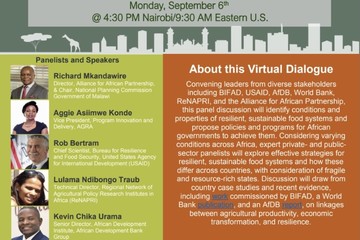
-
OpportunityAGRF 2021 SummitAAP Africa Office Associate Director, Isaac Minde, will be moderating the “Youth and Agri-food System’s Resilience in Africa” session at The AGRF Summit Pre-Day event on Sept. 6th. AGRF and its partners organized a three-day summit, September 7-10 around the theme of “Pathways to Recovery and Resilient Food Systems”. The AGRF 2021 Summit is a defining moment in highlighting and unlocking the policy, and financial commitments and innovations the continent has made and that it continues to work towards achieving. AAP recognizes the importance of these sustainable development goals and is looking forward to the participation of our colleagues throughout the Summit. Register for this year’s summit: https://bit.ly/3xVWZp2By: Raquel AcostaFriday, Sep 3, 2021AGRI-FOOD SYSTEMS+1
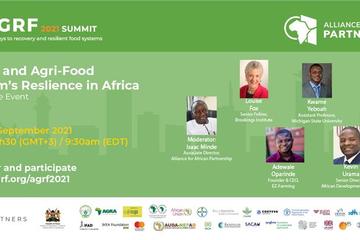
-
OpportunityPartnerships for Enhanced Engagement in Research (PEER) 2021/2022 SolicitationOn August 23, 2021, PEER released its latest call for proposals, which aims to support research projects that focus on the impacts of COVID-19 and potential solutions that can emerge from this pandemic. The COVID-19 pandemic has led to unprecedented global challenges and uncovered weaknesses in the ability of governments, the private sector, and local and international actors to deliver services and resources across many systems. This has been true in food and agriculture, healthcare, and education, among other sectors. However, the pandemic also has inspired innovation in areas such as digital technology and social organization, and there are many examples of countries or communities effectively coordinating to confront this threat. This PEER funding opportunity looks to support locally-led research projects that (1) aid in our understanding of how shocks such as COVID-19 affect key sectors in developing countries and (2) test approaches to help communities and sectors respond to and mitigate the effects of COVID-19 or similar future shocks.Projects funded under this year’s call for applications will receive one-year awards of up to US $70,000. In addition, they will receive personalized training and guidance from USAID’s Research Technical Assistance Center on developing evidence-to-action plans and communications products. The deadline for submission of pre-proposals is October 22, 2021. For further details please review the Request for Applications.By: Derek TobiasThursday, Sep 2, 2021HEALTH AND NUTRITION
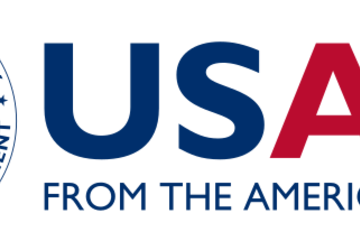
-
OpportunitySouleymane Bachir Diagne in conversation with Wayne Modest, Aude Christel Mgba, and Ryan Skinner.CONVERSATION | 9 Sept 2021 | 16.00-17.45 CET | Zoom online As part of the Thinking With series, we invite Souleymane Bachir Diagne to discuss his work in conversation with Aude Christel Mgba and Ryan Skinner. In African Art as Philosophy: Senghor, Bergson and the Idea of Negritude (2011), Souleymane Bachir Diagne writes of Léopold Sédar Senghor’s lifelong project to think through “affirmation of the self [as] a natural reaction to colonial domination” (188): “Beyond affirming the aesthetic virtues revealed in pieces of art created by Africans, Senghor wished to stress the metaphysics they offered for reflection: along with the art through which it had been written, he wished to rescue a worldview, a feeling and a thinking that were also contributions to the humanism of tomorrow by African-being-in-the-world” (7-8). “In our efforts at the Nationaal Museum van Wereldculturen to better honor and listen to the lives the ‘objects’ in our museums have led and wish to lead, we hope to better think more reciprocally in relationship to these objects and the communities invested in their being. We are compelled by Diagne’s work to think more deeply about the histories, afterlives, and temporalities in which our objects exist. How might we allow the objects to speak better from themselves, for themselves, while all the while honoring the complex positionalities of those who are enjoined to engage these objects? We understand those persons who are called upon to better honor the objects to be: those living in the places where the objects were obtained (gifted, seized, stolen); those who relate to African art from diasporic sensibilities; and those who are implicated by a colonial past as perpetrator and/or who benefit from systems of privilege, as per Michael Rothberg. Together, in Relation, and even thanks to the tensions implied by Glissantian Opacity, we hope to better be responsible to our work and engagement as professionals and visitors to our ethnographic museums.” More about Zoom event: https://www.materialculture.nl/en/events/thinking-souleymane-bachir-diagne-african-art-phi... Registration for Zoom event: https://us06web.zoom.us/webinar/register/WN_X6gKuBv3RVuw5FEGTCE6uwBy: Raquel AcostaThursday, Sep 2, 2021CULTURE AND SOCIETY+1
No Preview Available -
OpportunityCall for Abstracts: "Relations to Plants as a Heritage From Below in African Cities"The deadline for submitting a paper for the panel "Relations to Plants as a Heritage From Below in African Cities" at the next African Studies Association of Africa (ASAA) conference, at the University of Cape Town (South Africa) from 11 to 16 April 2022, has been extended to 30 September. The submission of the paper proposal (max. 250 words) has to be done via this platform: https://2022conference.as-aa.org/submit-work/call-for-abstracts/ ASAA encourages paper presenters to reflect on the conference theme and address issues outlined in the theme description. With a massive number of abstracts submitted for presentations at ASAA conferences, the ASAA2022 Conference Committee is dedicated to guaranteeing a timely and fair review process with the international norms of double-blind peer review. The decisions of the Scientific Committee will be communicated on 14th November 2021. ASAA early-bird registration will open on 1st November 2021. See eligibility criteria and learn about the application process in the link below! Call for abstracts – ASAA2022 (as-aa.org) For any queries with the above, please email: as-aa2022.org@uct.ac.zaBy: Raquel AcostaThursday, Sep 2, 2021CULTURE AND SOCIETY+1
No Preview Available

Leave a comment